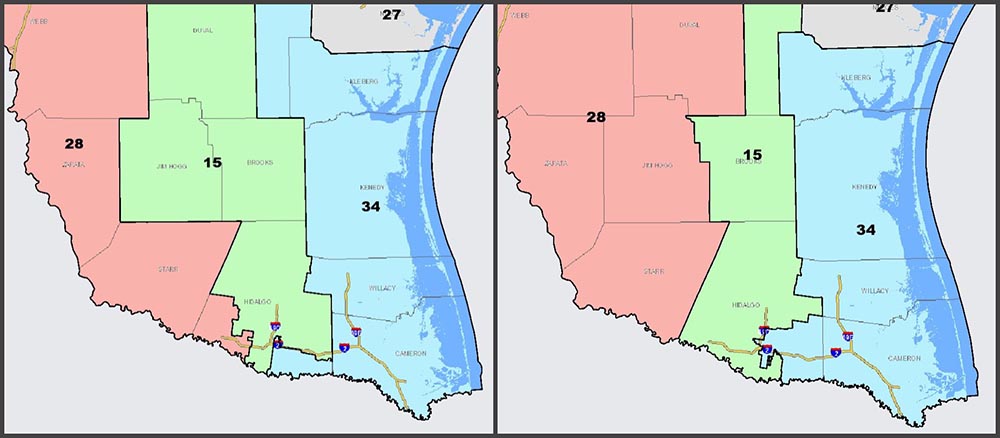Over a dozen plaintiffs, including a Rio Grande Valley organization, sued Gov. Greg Abbott over redistricting maps passed by the Texas Legislature that they believe violate the voting rights of the Latino community in Texas.
Plaintiffs believe the new plans in Congressional District 34 and 15 are being “packed” and “cracked” to, respectively, lumping voters into areas that already elect minority leaders or breaking up large groups and pushing them into conservative districts.
“This is the politicians picking the voters instead of the voters picking the politicians,” Domingo Garcia, president of the League of United American Citizens, said Tuesday during a virtual news conference.
After the 2020 Census, Texas was the only state to grow enough within the last decade to merit two additional seats in the U.S. House of Representatives. About half of that growth is due to the addition of nearly 2 million Latinos. Now, the Latino population comprises 39.3% of the Texas population, almost the same percentage, 39.7%, of Anglos.
Yet, the lawsuit filed by the League of United American Citizens, La Union del Pueblo Entero and others, stated, the maps “do not reflect the population shifts… and are unconstitutionally malapportioned.”
“Both the two new congressional districts that resulted from the growth were drawn to favor the election of non-minority candidates,” Juanita Valdez-Cox, executive director of LUPE, said. “Only one term can accurately explain those results: racial discrimination.”
Three maps, known as H2316, S2168 and E2106, were approved by the legislature Oct. 15 and 16. But before the maps arrived at the governor’s desk, the plaintiffs sued claiming they “violate their civil rights because the plans unlawfully dilute the voting strength of Latinos.”

Congressional District 34 currently only covers southern Hidalgo County, but under the new map the district will now include the northeastern part of Hidalgo County above the Expressway and south of State Highway 107.
District 28, currently held by U.S. Representative Henry Cuellar, will end sharply along the Starr County line and no longer include any portions of Hidalgo County.
“In South Texas, Plan C2193 weakens Latino voting strength in Congressional District 15 by intentionally “packing” Latino voters into neighboring Congressional District 34,” the lawsuit stated.
“A more fair map would have balanced the Latino population better between those two congressional districts,” Nina Perales, Mexican American Legal Defense & Educational Fund counsel, said Tuesday.
The plaintiffs, the Latino Task Force South Texas, proposed other maps.
“Instead, what we saw is called ‘packing’ and ‘cracking’ where District 34 is packed with so many Latinos, that it is almost 80% Latino. And at the same time, the district right next door, which is District 15, is stripped down in an attempt to make it look like a Latino majority district,” Perales said. “But it is very intentionally crafted to be a very fragile, or a marginal Latino opportunity district. This is essentially trying to make 15 into a sham district.”
This time, unlike other redistricting plans that needed ‘preclearance,’ or the approval of the federal government, the state won’t need to go through that process, a result of a Supreme Court decision, Shelby County, Alabama V. Attorney General.
“Before the Supreme Court ruling in Shelby they probably would’ve been blocked in Washington D.C. But instead the burden has shifted to community based organizations, civic engagement organizations … to file a lawsuit,” Perales explained.
Lawsuits against Texas after redistricting have become customary for LULAC.
“Since 1970, LULAC has filed a lawsuit against the state of Texas every ten years due to its political gerrymandering against the Latino community. But, we’ve never seen the Republican party or anybody else go to the extreme we’ve seen this year,” Domingo Garcia, LULAC National President, said Tuesday.
The lawsuit is seeking new plans for all four redistricting maps that, “one, do not weaken existing Latino majority districts as these plans do, and, two, create a net increase of the number of Latino opportunity districts in the state,” Perales said.




